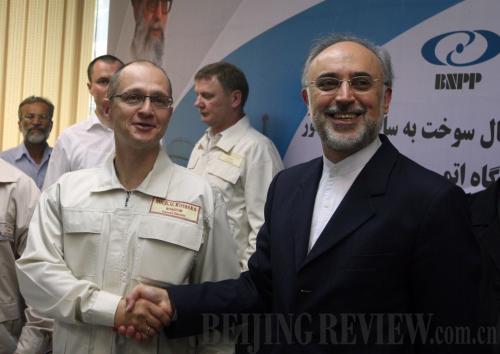|
 |
|
NUCLEAR PARTNERS: Head of Iran's Atomic Energy Organization Ali Akbar Salehi (right) shakes hands with his Russian counterpart Sergei Kiriyenko during a ceremony initiating the transfer of fuel to the Bushehr Nuclear Power Plant on August 21 (XINHUA/AFP) |
Since the possibility of a nuclear Iran became a major issue in 2003, the United States has worried a nuclear-armed Iran would threaten its strategic interests. It has attempted to topple the Iranian regime by using international pressure.
Washington pushed Iran into a corner, and the White House lost its only opportunity to ease tensions with Iran. Intense U.S. pressure drove politicians with moderate stances on the nuclear issue from Iran's political stage. When Mahmoud Ahmadinejad, who is more radical and forceful with the United States, became president in 2005, the Iranian authorities stopped wavering between compromise and confrontation—they chose to fight.
Iran resumed uranium enrichment immediately after Ahmadinejad took office. The country has since greatly enhanced its enrichment ability. It now has more than 5,000 centrifuges and 2.06 tons of 3.5-percent enriched uranium. According to the latest IAEA report, Iran has the ability to independently produce 20-percent enriched uranium.
In addition to Iran's domestic politics, the George W. Bush administration's hard-line policy should also be considered responsible for Iran's growing nuclear ambitions.
Promising "change we can believe in," Obama entered the White House in 2009. He said he would engage Iran with no preconditions, and acknowledged Iran's right to peacefully use nuclear energy. But Iran's offering price was higher than it was in 2003. And while the United States will never accept Iran as a friend, levying sanctions will trap Obama in the same swamp as Bush.
Iran is of strategic importance to Russia. Russia considers Iran as an important point of support in the south. Iran is a trump card that Russia can use to return to prominence in the Middle East. Since the early 1990s, Iran has been Russia's partner in containing extremist Islamic forces in the North Caucasus, maintaining Russian influence in Afghanistan and preventing Turkish expansion in the South Caucasus. Russia and Iran are both interested in keeping the United States away from energy resources in the Caspian Sea.
Russia also has great economic interests in Iran, as Iran is a major market for Russian weapons. From 1990 to 1996, Russia sold more than $5 billion worth of weapons to Iran and in November 2005, the two countries signed a missile contract valued at $1.4 billion. They also cooperate in the aviation and space fields. They signed a $132-million satellite launch contract in January 2006 and in September 2008, they held negotiations and agreed to export Russian precision-guided missiles to Iran.
When it comes to Iran, the United States and Russia have more conflicts than common interests. Moscow and Washington both hope to keep Iran from obtaining nuclear weaponry. But if the United States corners Iran, through sanctions or military actions, and seeks to change the current Iranian leadership, it will greatly damage Russia's economic and strategic interests. Such actions will, of course, be unacceptable to Russia.
The author is a former Chinese Ambassador to Iran | 